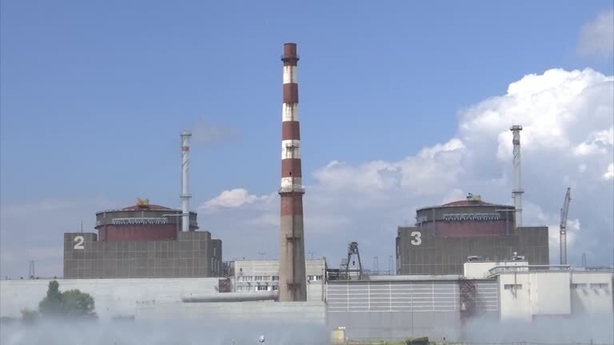Russia has accused Ukraine of attacking the Zaporizhzhia nuclear power station with a drone for the second day running, after Kyiv had earlier pointed the finger at Moscow.
The plant in southern Ukraine, Europe's largest nuclear facility, has been under the control of Russian forces since the first days of the military offensive in early 2022.
Both sides have regularly traded accusations of attacking the facility over the last two years, accusing each other of risking a potentially devastating nuclear disaster.
"Attempts by the Ukrainian armed forces to attack the Zaporizhzhia nuclear power plant continue," the Russians controlling the facility said on Telegram.
"Today a kamikaze drone was shot down over the plant. It fell on the roof of unit 6," they said, referring to one of the power station's reactors.
We need your consent to load this rte-player contentWe use rte-player to manage extra content that can set cookies on your device and collect data about your activity. Please review their details and accept them to load the content.Manage Preferences
They said there was no threat to the plant's safety.
Russian forces have controlled the Zaporizhzhia nuclear plant since seizing it in March 2022.
Ukraine had earlier said Moscow was spreading "fake" information that Kyiv had fired drones at the plant yesterday.
The head of Ukraine's centre for countering disinformation Lieutenant Andriy Kovalenko said Russia was intensifying a "campaign of provocation and fakes".
He said it was Russia that was attacking the facility "with drones, pretending that the threat to the plant and nuclear safety is coming from Ukraine".
Russia's nuclear agency Rosatom said there was a "series of attacks" yesterday.
It alleged that one drone had struck the site's canteen, wounding three staff members, one of them "severely".
Drones also hit a cargo port and the roof of one of the power plant's six nuclear reactors, it said.
The International Atomic Energy Agency (IAEA), which has experts at the plant, said yesterday's strikes resulted in one casualty.
"This is a major escalation of the nuclear safety and security dangers facing the Zaporizhzhia nuclear power plant.

"Such reckless attacks significantly increase the risk of a major nuclear accident and must cease immediately," Director General Rafael Grossi said yesterday.
The IAEA said there were no indications of "damage to critical nuclear safety or security" and that radiation levels were normal.
Rosatom urged Mr Grossi and Western nations to "categorically condemn" the attack.
Ukraine's Mr Kovalenko accused Russia of "manipulating the concerns of the IAEA" and "trying to accuse Ukraine of nuclear terrorism".
A spokesman for the Ukrainian defence ministry's main directorate of intelligence Andriy Yusov had earlier accused Russia of endangering the power station and carrying out "simulated strikes".
Separately, a Russian missile attack today hit an industrial facility in Zaporizhzhia, injuring at least six people, local authorities said.
Ivan Fedorov, the regional governor, did not provide any details regarding the type of facility in his message on Telegram.
Russia targets '80% of Ukraine plants'
Meanwhile, Ukrainian energy minister German Galushchenko has said that Russia has hit up to 80% of Ukraine's conventional power plants and half its hydroelectric plants in recent weeks.
Moscow has launched almost daily strikes on Ukraine's power grid since late March, causing major blackouts in the northeastern city of Kharkiv.
"Up to 80% of thermal generation was attacked. More than half of hydro generation and a large number of substations," Mr Galushchenko told journalists in Kyiv.
"This is the largest attack on Ukraine's energy sector" since war began, the minister said.
Before Russia's invasion, Ukraine's power generation was fairly evenly balanced between coal, natural gas and nuclear, with a smaller percentage of hydroelectric.
Mr Galushchenko said that "the scale and impact of these attacks is much greater" than earlier attacks over the winter from 2022 to 2023 when millions suffered in freezing temperatures without electricity and heating.
"We see that Russians modified the weapons," the minister said, adding that they now use Iranian-style explosive drones and missiles that cause more damage per attack.

